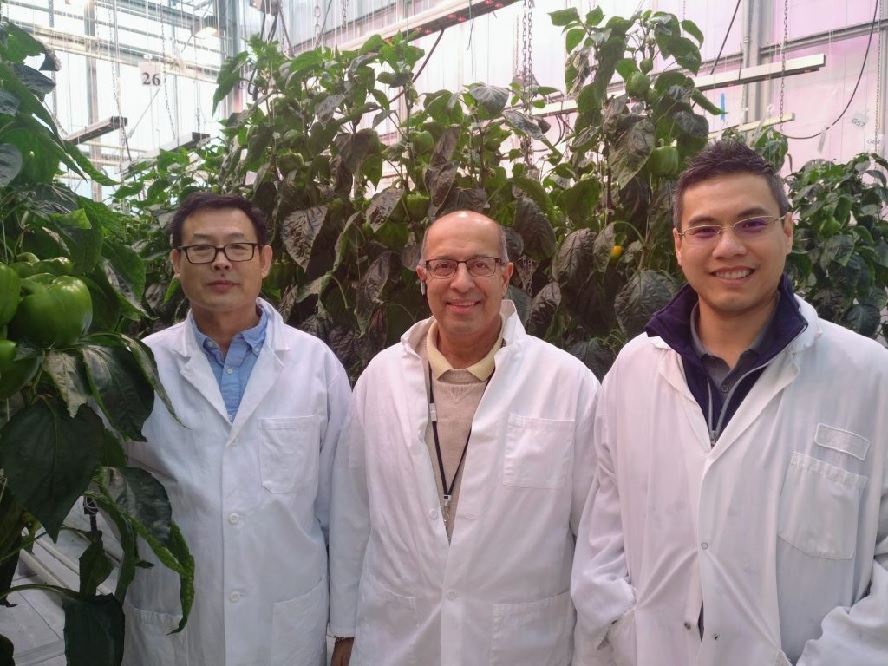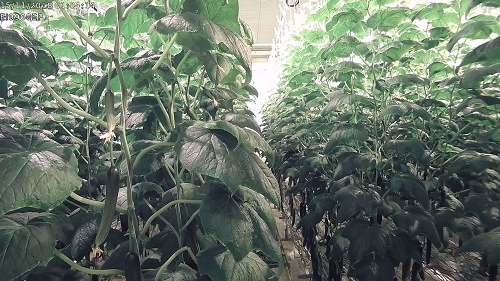
Mother Nature has nothing on the magic that comes from combining Artificial Intelligence (AI) with the kind of horticultural expertise that Dr. Xiuming Hao provides. The Agriculture and Agri-Food Canada's (AAFC) researcher has spent his entire career creating the crispy, green kind of magic that produces lots and lots of cucumbers in a limited amount of time and space. These skills were put to the test when his team competed in an international competition focused on harnessing AI to improve food security.
Becoming AAFC’s cucumber king
No stranger to growing food, Dr. Hao's career in horticultural research began on his parents' wheat and soybean farm, in China, fostering a passion for agriculture that continues to this day. He never wandered far from the open fields of farming as he grew up and harvested international degrees in everything from horticulture to plant physiology. His studies eventually brought him to what he considers the epicentre of horticultural research excellence: AAFC's Harrow Research and Development Centre.
On his first day of work in 1995, he began his study of cucumbers. He chose to focus on cucumbers because they are one of the world's biggest greenhouse crops, and one that Canada excels at producing. His aptitude in using AI to grow cucumbers is fueled by his passion "to work with technology to help the farmer, especially with greenhouse crops."
Facing the challenge
Dr. Hao’s cucumber expertise eventually attracted the attention of Dr. Kenneth Tran, who was with Microsoft Research at the time.
Dr. Tran found Dr. Hao as he began searching for team members to join his bid to win the first international Autonomous Greenhouse Challenge. The Challenge was created by Wageningen University and Research in the Netherlands to demonstrate AI's importance to food security as the world's population climbs past 7.8 billion and climate change and limited natural resources disrupt current agricultural practices.
"I read about Dr. Hao's research and contacted him to see if we could meet and discuss this project," says Dr. Tran, who was the team's leader. "After seeing his greenhouse work at AAFC, I knew he would be the right person to partner with."
Dr. Hao and Dr. Tran assembled their team from provinces, universities, private companies and beyond, including Microsoft Research’s Mr. Chetan Bansal, Wageningen University & Research student David Katzin, Ontario Ministry of Agriculture’s Shalin Khosla, and AAFC’s Jingming Zheng and Quade Digweed.
The two researchers were confident they could grow cucumbers in a greenhouse controlled solely by AI but the Challenge's tight four-month timeline and large distances could make things tricky. The greenhouse space was in the Netherlands, thousands of kilometres from Dr. Hao's team in Harrow, Ontario and the Microsoft Research headquarters in Washington State, USA.
Green dream team
Dr. Hao's knowledge and attention to the smallest horticultural details was well-matched with Dr. Tran's strengths in AI whose computer dashboard shrank the huge distances of this competition.
"Over the years, I've developed sustainable year-round, high-wire cucumber production systems—a very good foundation for this competition." says Dr. Hao. Team meetings were energetic with young team members asking lots of questions. "The dynamic between everyone was really good, very collaborative. We had the same goal but they never grew cucumbers before! They asked so many questions—always trying to find justification for each decision. They were really eager to learn."
It wasn't all smooth sailing. Fluctuations in crop health caused ripples of stress. Examining 300 photos of the cucumber crop a day, Dr. Hao looked for the tiniest signs of imminent disaster. Warm temperatures can lead to small leaves which affect the cucumber size. Any change in leaf size saw the team fine-tuning their model using Dr. Tran's AI dashboard.
The results

Each of the five international teams in the competition applied different strategies towards using the Challenge's 96 square metres of remotely-controlled greenhouse space. The final results spoke volumes, literally. Dr. Tran and Dr. Hao's team grew 55 kilograms of cucumbers per square metre, winning first place—25 percent more than the second-place team. That's approximately 14,400 cucumbers in just 4 months.
They also used the fewest inputs of fertilizer, water, energy and pesticides. Dr. Tran's dashboard was key to achieving this best score on total sustainability. "Usually it takes quite a bit to calculate costs like electricity and heating before making adjustments. With the dashboard, we could see right away!" says Dr. Hao.
The team's win proved that AI has a place in future food production and that Canada is going to be a leader. "With AI, everything's recorded 24/7. You can't get that with just people monitoring the crops," he says.
The win is an important step towards finding solutions for food insecurity. Dr. Hao and his team's commitment to horticultural science, artificial intelligence and the humble cucumber is leading the way to a crunchy, nutritious and automated future.
Get more Agri-info
- Want more stories like this? Explore what else Agri-info has to offer.
- Interested in reporting on this story? Contact AAFC Media Relations at aafc.mediarelations-relationsmedias.aac@agr.gc.ca to arrange an interview with one of our experts.